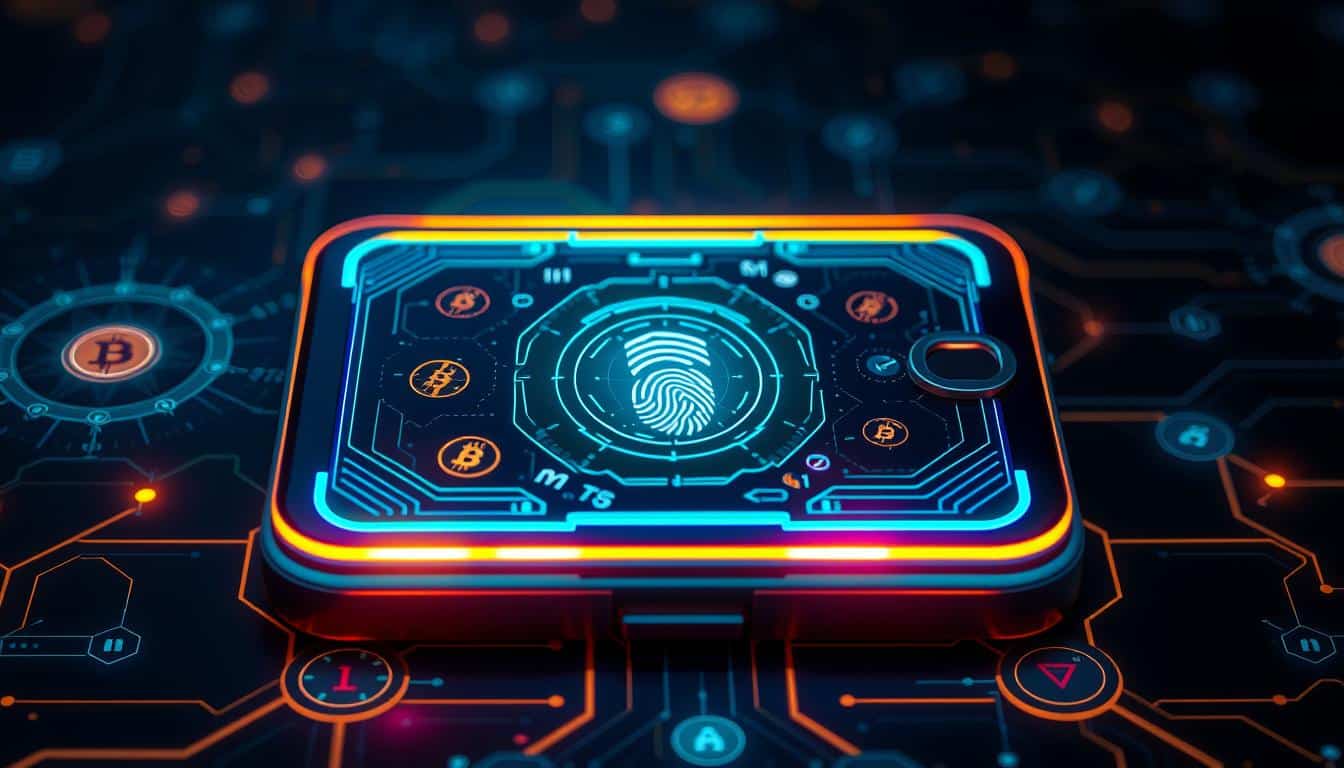Cryptocurrency has changed how we think about money and transactions in the digital world. It’s a digital payment system that doesn’t need cash or a government to check transactions. This digital money is used for online and some in-person purchases. It’s the same everywhere, so its value doesn’t change when you buy, sell, or trade it.
Key Takeaways
- Cryptocurrency is a digital form of money that operates independently of traditional banking systems and government control.
- Cryptocurrencies use blockchain technology to facilitate secure and transparent transactions without the need for a central authority.
- The most well-known cryptocurrency is Bitcoin, but there are thousands of other cryptocurrencies, each with its own unique features and applications.
- Cryptocurrencies offer potential benefits such as increased privacy, lower transaction fees, and accessibility to those without traditional banking options.
- However, cryptocurrencies also come with risks, including volatility, limited regulation, and the potential for illegal activities like money laundering and fraud.
What is Crypto Currency?
Cryptocurrency is a new way to pay that has changed how we see money. It’s not like the money we use every day. Cryptocurrencies live only online and are used for buying things online and sometimes in stores. They are made on blockchain technology, a special kind of digital ledger.
Also Read : Exploring Technology: Innovations For The Future
This ledger keeps track of money moves without needing a government or bank to say it’s okay. It’s a big change from the old way of doing things.
Also Read : Exploring Artificial Intelligences Trends & Insights
Definition and Key Features
Cryptocurrency is a type of digital money that is the same everywhere. Its value doesn’t change when you buy, sell, or trade it. These digital currencies are safe, open, and don’t rely on one single group to keep track of them.
Also Read : What Is Workforce Diversity In US Government Agencies?
They use a public network called blockchain to check and record money moves. This means no government or bank is needed to make sure everything is okay. It’s a way for people to pay each other directly.
Also Read : Protect Your Business With Commercial Insurance
Cryptocurrencies are only found online and are used for buying things online and sometimes in stores. They are bought, sold, and traded on special websites. Their value changes based on how much people want them. Unlike regular money, no single group controls them, which has good and bad sides.
Also Read : How Do You Choose A Dissertation Topic?
| Feature | Description |
|---|---|
| Decentralization | Cryptocurrencies are decentralized, meaning they are not controlled by any government, bank, or other central authority. |
| Transparency | All transactions on the blockchain network are publicly visible, ensuring transparency and accountability. |
| Security | Cryptocurrencies use advanced cryptography to secure transactions and protect against fraud and theft. |
| Fungibility | Cryptocurrencies are fungible, meaning each unit is interchangeable and has the same value as any other unit. |
“Cryptocurrencies have the potential to revolutionize the way we think about money and financial transactions, providing a secure, decentralized, and transparent alternative to traditional fiat currencies.”
How Does Crypto Currency Work?

Cryptocurrencies run on blockchain technology, a secure way to keep track of transactions. This system solves a big problem of the past: stopping people from spending the same money twice. It does this by using complex codes and a network spread out across the globe. This makes sure each digital coin or token is unique and can only be used once.
Mining and Transaction Verification
At the core of cryptocurrencies is mining and verifying transactions. Cryptocurrency mining is when computers solve hard math problems to add new transactions to the blockchain. Miners get rewarded with new coins for their work.
After verifying, transactions are put into blocks and added to the blockchain. This makes a permanent, safe record. This way, the network stays secure and honest, keeping it safe from fraud.
| Cryptocurrency Work | Blockchain Technology | Cryptocurrency Transactions |
|---|---|---|
| Cryptocurrencies are supported by blockchain technology, which maintains a tamper-resistant record of transactions and keeps track of who owns what. | Blockchain technology is a distributed ledger system that uses complex cryptography to create a secure and immutable record of transactions. | Verified transactions are grouped into blocks and added to the blockchain, creating a permanent and unalterable record of cryptocurrency transactions. |
Blockchain technology and mining are key to making cryptocurrencies work. They allow for safe and open transactions between people, without needing a middleman.
Types of Crypto Currencies

The cryptocurrency market is huge, with over two million digital currencies out there, says CoinMarketCap.com. Bitcoin is the top and most valuable one. But, the industry has grown to include many other coins, called “altcoins.”
Some altcoins that stand out in the market are:
- Ethereum (ETH): This platform lets people create and run smart contracts and apps without a middleman.
- Cardano (ADA): It focuses on being secure, fast, and green. It’s all about solid research and peer-reviewed methods.
- Solana (SOL): This blockchain is super fast and cheap thanks to new tech that makes transactions quick and low-cost.
- Dogecoin (DOGE): Started as a joke, it’s now a serious player with a big following and a good market size.
- XRP (XRP): It’s made for quick, cheap cross-border payments. Banks and remittance services use it a lot.
These and many other cryptocurrencies have their own special features and uses. They meet different needs and wants of the crypto community. As the industry grows, we’ll see more new and innovative coins.
| Cryptocurrency | Market Capitalization (USD) | Use Cases |
|---|---|---|
| Bitcoin (BTC) | $1.1 trillion | Store of value, digital payments, investment |
| Ethereum (ETH) | $260 billion | Smart contracts, decentralized applications, NFTs |
| Cardano (ADA) | $36 billion | Blockchain-based financial services, digital identity, supply chain management |
| Solana (SOL) | $24 billion | Decentralized finance (DeFi), scalable blockchain solutions |
| Dogecoin (DOGE) | $10 billion | Peer-to-peer payments, community-driven cryptocurrency |
| XRP (XRP) | $23 billion | Cross-border payments, financial institution settlements |
The variety in the crypto market gives investors, users, and developers lots of choices. It’s a big part of the growing digital economy.
Crypto Currency vs. Traditional Currency

Cryptocurrencies and traditional currencies are very different. It’s important to know these differences if you’re into digital finance.
One big difference is how they are made and controlled. Fiat currencies like the U.S. dollar are made and watched over by central banks and governments. Cryptocurrencies, however, don’t have one person in charge.
Another big difference is how transactions work. Traditional currency deals go through banks and clearing houses. But, cryptocurrency transactions are on a public ledger called the blockchain, kept by many computers.
How you store these currencies is also different. You can keep traditional currency in cash or a bank account. But, cryptocurrencies go in digital wallets on your device or online.
Investing in traditional currency is usually seen as stable. Its value changes with things like inflation and government policies. Cryptocurrencies, though, can go up and down a lot. Their prices change with many things, like market feelings and new tech.
Rules for these currencies are also different. Traditional currencies have lots of government rules. But, cryptocurrency has fewer rules, with different levels of oversight in each place.
Even with their differences, both kinds of currency aim to help with global transactions. Cryptocurrencies are getting more popular in some areas, like sending money across borders. They offer speed, low cost, and easy access.
In short, the main differences between cryptocurrencies and traditional currencies are in how they’re made, regulated, and used. Knowing these differences helps you understand digital finance better.
Pros and Cons of Crypto Currency

Cryptocurrencies have both good and bad sides compared to regular money. It’s key to know these points if you’re thinking about using digital money.
Advantages of Cryptocurrencies
- They offer privacy and anonymity since they’re not linked to your identity.
- You can make global transactions fast and without the usual banking delays.
- They might have lower banking fees and are more accessible, especially for those without easy access to traditional banks.
- Their volatility could be a chance for investors to make money.
Disadvantages of Cryptocurrencies
- They’re not yet regulated, which means they’re at risk of theft and loss.
- Their volatility makes them not very good as a stable way to exchange value.
- They have a big environmental impact because mining them uses a lot of energy.
- They’re not yet widely adopted or used like regular money, which makes them less accepted and useful.
| Pros of Cryptocurrencies | Cons of Cryptocurrencies |
|---|---|
| Privacy and anonymity in transactions | Lack of regulation and risk of theft/loss |
| Ability to conduct global transactions quickly | High volatility in prices |
| Reduced banking fees and increased accessibility | Significant environmental impact from mining |
| Potential for volatility-driven investment returns | Limited adoption and use cases |
The good and bad sides of cryptocurrencies show their potential and challenges. Before jumping in, it’s smart to think about the pros and cons to see if they fit your needs and goals.
Getting Started with Crypto Currency

Starting with cryptocurrency is exciting and rewarding if you’re prepared. Whether you want to buy cryptocurrency, invest, or trade, knowing the basics is key. This digital financial world is vast and complex.
Setting Up Your Crypto Wallet
A secure crypto wallet is the first step in your cryptocurrency journey. It’s where you keep your virtual currencies like Bitcoin, Ethereum, and others. There are hot wallets (online) and cold wallets (offline), each with their own security levels.
Choosing a Crypto Exchange or Broker
Deciding how to get your cryptocurrency is the next step. Look at cryptocurrency exchanges and brokers for options. They offer simple buys to complex trading tools. Make sure to check fees, features, and follow local cryptocurrency laws.
Exploring Cryptocurrency Education
It’s important to keep learning about cryptocurrency. Look for trustworthy cryptocurrency courses and resources. They should cover security, taxes, and blockchain technology.
Getting started with cryptocurrency is a journey of discovery. Take time to learn the basics, build a strong foundation, and explore the market’s opportunities.
Also Read : How Green Technology Is Used In Agriculture?
Conclusion
Cryptocurrency is changing how we see money and financial deals. It uses blockchain tech for a secure, private way to move value. This doesn’t need banks or other financial middlemen.
This tech is growing fast, bringing new ways to pay across borders and help more people get financial services. It also keeps data safe and private. Blockchain tech is not just for digital money. It could change how we manage supply chains, buy real estate, and vote.
Even with issues like price swings and growing pains, cryptocurrency’s impact on finance is huge. As we learn more about it, we see it changing how we handle money and transactions. Cryptocurrencies and blockchain are set to reshape the future of finance.
FAQs
Q: What is cryptocurrency and how does it work?
A: Cryptocurrency is a type of digital or virtual currency that uses cryptography for security. It operates on a technology called blockchain, which is a decentralized ledger that records all transactions across a network of computers. The first cryptocurrency was Bitcoin, which introduced the concept of a decentralized digital asset.
Q: Is investing in cryptocurrency a good investment?
A: Investing in cryptocurrency can be a good investment for some, but it also comes with high risks due to the volatility of cryptocurrency prices. It’s essential to conduct thorough research and consider factors like market cap, historical performance, and your own risk tolerance before investing in Bitcoin or another cryptocurrency.
Q: How can I buy Bitcoin?
A: You can buy Bitcoin through many cryptocurrency exchanges that allow you to buy and sell cryptocurrencies. You can create an account, deposit funds, and then buy Bitcoin using fiat currency or another cryptocurrency. Always ensure that the exchange is reputable and secure.
Q: What are the legal implications of cryptocurrency?
A: The legality of cryptocurrency varies by country. In many places, it is legal to buy, sell, and hold cryptocurrencies, but regulations may apply regarding taxation and reporting. It’s essential to check your local laws to ensure that you comply with any regulations concerning cryptocurrency legal status.
Q: What is the difference between Bitcoin and Ethereum?
A: Bitcoin is the first cryptocurrency and primarily serves as a digital asset and a payment method. Ethereum, on the other hand, is a blockchain platform that enables developers to create decentralized applications (dApps) using smart contracts. While both are cryptocurrencies, they serve different purposes within the crypto market.
Q: How do I store my cryptocurrency safely?
A: To store cryptocurrency safely, you can use a hardware wallet, which is a physical device that keeps your private keys offline. Alternatively, you can use software wallets or exchanges, but ensure they have strong security measures in place. Always back up your wallet and keep your recovery phrases secure.
Q: Can I use cryptocurrency for everyday purchases?
A: Yes, many businesses now accept cryptocurrency as a payment method. You can use Bitcoin and other cryptocurrencies to buy goods and services, but acceptance may vary by location and retailer. Check if the merchant accepts cryptocurrency before making a purchase.
Q: What is a central bank digital currency (CBDC)?
A: A central bank digital currency (CBDC) is a digital form of a country’s fiat currency issued and regulated by the central bank. Unlike cryptocurrencies like Bitcoin, which are decentralized, CBDCs are controlled by government authorities and aim to combine the benefits of digital currencies with the stability of traditional currencies.
Q: How can I track cryptocurrency prices and market trends?
A: You can track cryptocurrency prices and market trends using various online platforms that provide crypto market data. Many cryptocurrency exchanges also offer real-time tracking features. Additionally, there are dedicated websites and apps that aggregate data on different cryptocurrencies and their market performance.
Q: What are the risks associated with buying and selling cryptocurrencies?
A: The risks of buying and selling cryptocurrencies include market volatility, potential loss of funds due to hacking, regulatory changes, and lack of investor protection. It’s crucial to be aware of these risks and consider them before engaging in crypto transactions or investing in crypto assets.


